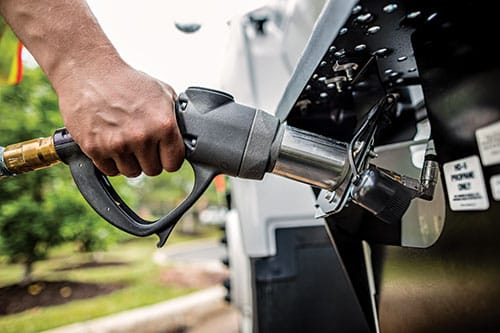Propane Autogas

Looking for a clean, efficient fuel source?
Propane autogas, the term used when propane is used as a motor fuel, offers many advantages for school bus, transit bus and fleet vehicle managers.
Propane is a clean, American-sourced energy that contributes to a cleaner environment, a key component in realizing a lower-carbon future. While electric vehicles get most of the attention, the general public may be unaware that autogas is superior to electric vehicles when it comes to overall emissions. But environmental benefits are only a fraction of the value that propane autogas brings to the table for businesses, school districts, and national parks alike.
Benefits of Propane Autogas
Clean Energy
The combustion of autogas is more complete and efficient than gasoline or diesel, which means that the amount of carbon monoxide and hydrocarbon emissions are far less. The tailpipe emissions from an autogas engine are mostly just carbon dioxide and water, emitting virtually no soot. This is also why autogas engines run so much cleaner than diesel, which in turn requires less maintenance. In addition, autogas doesn't contaminate soil, air and water, and it does not degrade over time, which is not the case with conventional gasoline.
When comparing fuel emission profiles, propane school buses produce significantly less than those from diesel buses. According to a study done by West Virginia University, while driving on residential pick-up and drop-off routes, emissions of nitrogen oxides (NOx) were 34 times lower for autogas than for diesel buses. Overall, NOx was reduced by 96% and carbon dioxide fell by 13%. In the city and on highways, these air pollution emissions were anywhere between 15 to 19 times lower. What does all of this mean? That the natural composition of the propane molecule - rich in hydrogen with ultra-low carbon - is a key piece of a cleaner transportation system.
Cost-Effective
Propane is a plentiful, power-packed fuel. With an octane rating of 104-112, compared to 87-92 for gasoline, propane is an efficient and responsible way to replace gasoline and deisel in many applications. Yet, for all that power, propane traditionally costs less than other fuels. On average, propane autogas costs between 30% and 50% less per gallon than gasoline and diesel. The price of propane traditionally falls between the prices of natural gas and oil, which greatly limits market price fluctuations. Check out today’s price for propane.
Easy Refueling
There are several convenient refueling infrastructure options to choose from, depending on your fleet’s size. Quick-Connect nozzles make the process even easier. Gone are the days of mandatory gloves and goggles, now drivers can simply click in the nozzle, refuel, and go. Propane retailers located throughout the U.S. can help fleets get set up with propane autogas.
Reliable
Light or medium-duty, small or large fleet size, propane can handle the workload. While diesel engines spend valuable time in the shop for costly repairs on complex emissions systems, propane autogas vehicles keep your business running with reliable and clean operation. Additionally, propane vehicles start year-round, even during the harshest months of winter.
Reduced Noise Pollution
Propane autogas engines are noticeably quieter than their diesel counterparts which can give customers, students and communities a more pleasant and quieter experience. Drivers, riders and residents will appreciate the difference when service trucks, public transit vehicles or school buses operate in residential neighborhoods.
Produced in North America
All of the propane consumed in the United States is produced in North America. Every gallon you buy contributes to America’s energy independence. An abundant supply allows propane customers ample opportunity to ensure that they’ll always have enough on hand for their needs, making propane a dependable energy source all year long. One of the rising developments is the growth of renewable propane. Traditional crude processing plants are beginning the transition to the production of renewable fuels made from waste residues rather than from fossil fuels.
Two Days to a Greener Future
An increasing number of high-demand and light and medium-duty trucks, vans, cars, and chassis models can be converted to operate on propane autogas as the primary fuel and gasoline as the secondary fuel. Many delivery and fleet vehicles began their lives as gasoline engines and were later converted to autogas. The process of converting an existing vehicle to autogas is straightforward and takes on average only two days. Return on investment occurs quickly for high-mileage units, based on reduced fuel costs and savings in maintenance. OEM options are available too. The message for those on the fence is that it is never too late to get started.
Rebates and Incentives
There are a variety of state and federal rebates and programs available to assist you with the cost of converting fleet or general-purpose vehicles to propane or installing fuel stations. These rebates, combined with the environmental benefits and cost savings, make autogas a superior choice over gasoline engines.
More About the Benefits of Propane
Convert to Propane
If you’re thinking about expanding your use of propane, converting to propane for new appliances or switching to propane as your primary energy source, please contact your local propane company to learn more about your options.